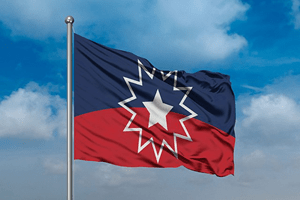
Many people may not be aware, but there are two Independence Days in America. Of course, the first is July 4th, when America freed itself from British rule. However, the second is a day many people don’t know about called Juneteenth. Juneteenth is the day when enslaved people in Texas found out they were free. Typically celebrated on June 19th, Juneteenth became a federal holiday in 2021.
President Abraham Lincoln released the Emancipation Proclamation in 1863 during the Civil War, which said that the three million enslaved people living in Confederate states were free. However, it wasn’t until 1865 that General Gordon Granger rode into Galveston, Texas, and announced that enslaved people were now free, much to the surprise of the enslaved people in Texas. Here are some interesting facts about Juneteenth that you may not know.
The news of freedom arrived two years after the Emancipation Proclamation.
Technically, the Emancipation Proclamation freed enslaved people in 1863. However, enslaved people in Texas didn’t find out about it until 1865, two years later. From the Union’s perspective, the 250,000 enslaved people in Texas were already free, but none of them knew it, and no one rushed to tell them.
There are numerous theories on why Texas didn’t enforce the Emancipation Proclamation.
Back in those days, news traveled slowly. For example, it took Confederates soldiers in western Texas over two months to learn that Robert E. Lee surrendered at Appomattox. Still, there’s been a struggle to explain the 30-month gap between the Emancipation Proclamation and enslaved people’s freedom. This gap led to speculation that some Texans may have suppressed the announcement.
Other theories say that the original messenger was killed to stop the information from being relayed or that the federal government delayed the announcement on purpose to get one more cotton harvest out of the enslaved people. However, the real reason may be that Lincoln’s proclamation wasn’t enforceable in the Confederate states before the war ended.
The freedom announcement urged freed people to stay with their owners.
When he arrived in Texas, General Granger read General Order No. 3, which read,
“The people of Texas are informed that, in accordance with a proclamation from the Executive of the United States, all slaves are free. This involves an absolute equality of personal rights and rights of property between former masters and slaves, and the connection heretofore existing between them becomes that between employer and hired labor. The freedmen are advised to remain quietly at their present homes and work for wages. They are informed that they will not be allowed to collect at military posts and that they will not be supported in idleness either there or elsewhere.”
What came after the freedom announcement is known as “the scatter.”
Most freedmen and women didn’t want to stay with their enslavers, even if they would get paid. Some were leaving while General Granger made the announcement. What came after is known as “the scatter,” where big groups of formerly enslaved people left Texas to find their family or other places where they’d be welcomed in northern states or Canada.
Everyone wasn’t freed instantly.
Texas is a relatively large state, and General Granger’s order was slow to spread. Historian James Smallwood says that many enslavers purposefully hid the information until after the cotton harvest, and some hid it beyond after the cotton harvest. In July 1867, there were two different accounts of enslaved people being freed. There was also a report of a Texas horse thief, Alex Simpson, who enslaved people were only released after he was hanged in 1868.
With freedom came other issues.
Texas enslavers weren’t too enthusiastic to part with what they felt was their property despite the announcement. Many freed people were beaten, lynched, or murdered when they tried to leave. Susan Merritt, a former enslaved person, recanted, “They would catch [freed slaves] swimming across [the] Sabine River and shoot them."
There were limited opportunities for celebrating.
When freed people tried to commemorate the first anniversary of the freedom announcement the following year, they were met with a big problem. Segregation laws were multiplying, so there weren’t any public places they were allowed to use. In the 1870s, formerly enslaved people raised $800 to buy 10 acres of land, which they named “Emancipation Park.” This park was the only public park and swimming pool in the Houston area in the Houston area open to Black people until the 1950s.
Juneteenth celebrations faded for decades.
Juneteenth celebrations declined during the Jim Crow era. Then came the civil rights movement of the 1960s and the Poor People’s March, planned by Martin Luther King Jr. This march was purposefully scheduled to overlap with the date of Juneteenth. This march brought Juneteenth back to the foreground. When participants took the celebrations back to their home states, the holiday was reborn.
Texas was the first state to make Juneteenth a state holiday.
In 1980, Texas regarded the holiday as worthy of statewide recognition, becoming the first state to do so.
The Juneteenth flag has lots of symbolism.
The Juneteenth flag is packed with meaning, just as the flag’s designer L.J. Graf intended. The colors red, white, and blue match the American flag to signify that the enslaved people and their descendants were American. The star in the middle symbolizes Texas, while the bursting star represents freedom and a new people.
As Juneteenth traditions spread around the United States, different places put their own spin on celebrations. For example, the holiday is usually celebrated in southern states with readings, oral histories, and barbecues. Other states serve Marcus Garvey salad in honor of the Black nationalist. Rodeos have also become a part of Juneteenth celebrations in southwest states. Concerts and parades are typical celebrations across the country.
Juneteenth is a day where Black people celebrate the freedom of their ancestors and remember the struggles they endured. Sadly, enslaved people in Texas didn’t learn of their release until two years later, but they would be glad to know that their descendants are still celebrating the holiday decades later.

